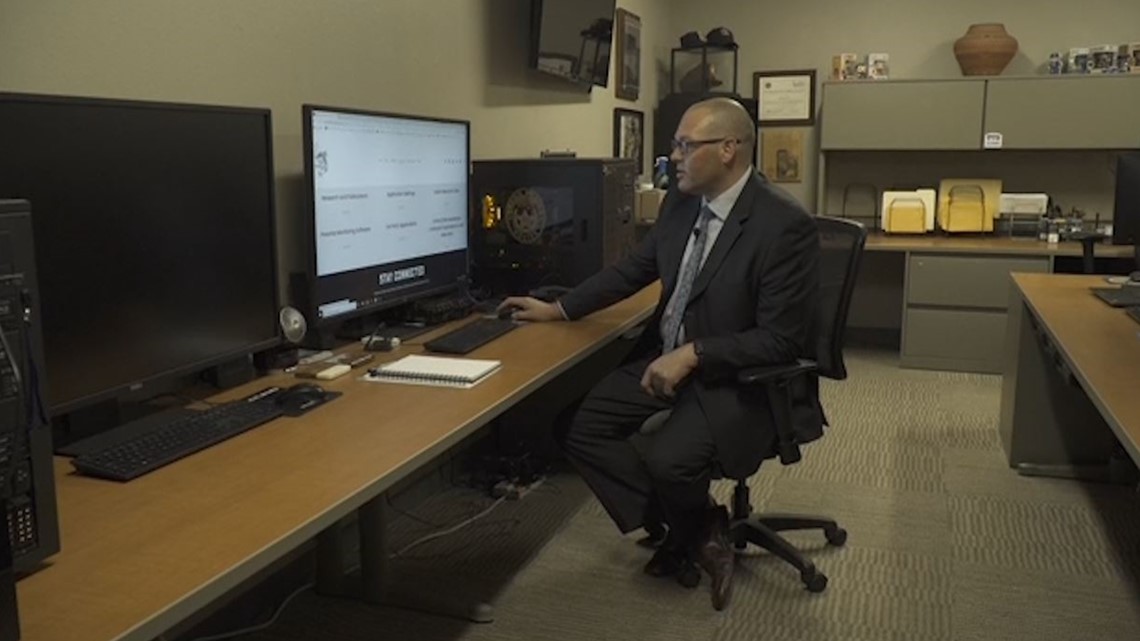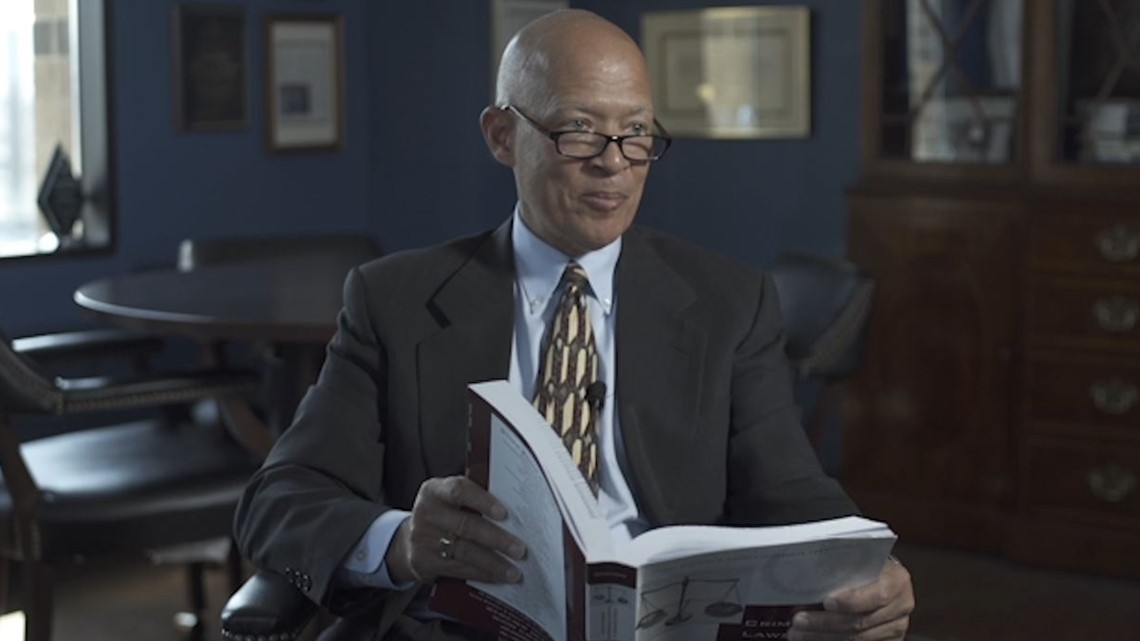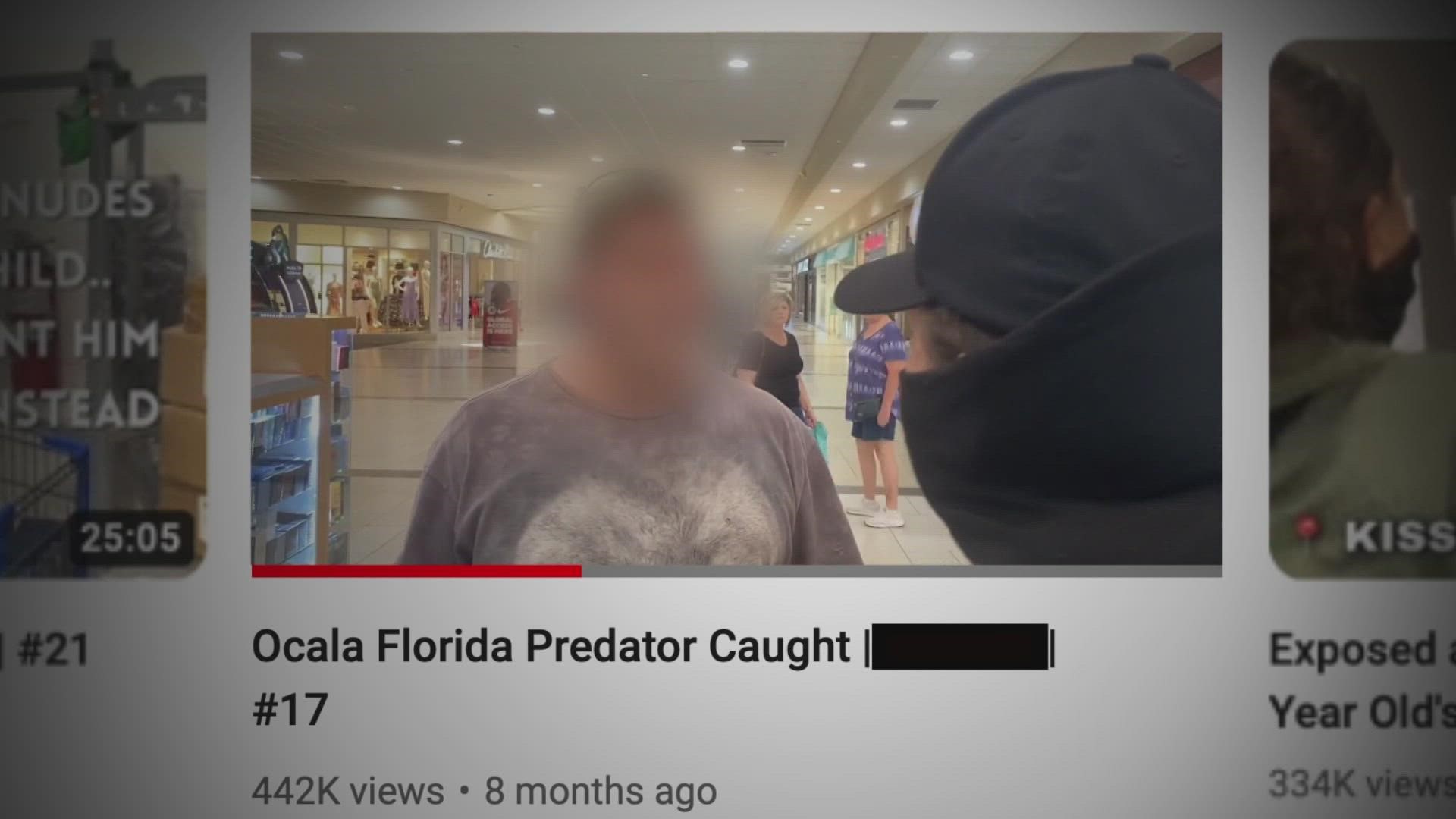DALLAS — As many aspects of Americans’ everyday lives continue to move more online, criminals are shifting their focus as well.
That includes child predators, and the people trying to stop them — both police officers and civilians.
According to data from multiple agencies, there has been a rise in reports of child sexual exploitation online in recent years. While different local, state and federal agencies are trying to protect families and stop these criminals, many social media influencers are also changing the focus of their videos to try catch these child predators in the act themselves.
But can both of these groups effectively and legally carry out their investigations at the same time?
Police say they cannot.
A department of one
Brandon Poor is a detective for the Grand Prairie Police Department. He has always been motivated to protect the most vulnerable — especially when they are young.
"There's no more innocent victim that we can protect as police,” Poor said of children.
This is a big reason why he created the Internet Crimes Against Children Unit within the police department in 2016. Poor said he was already working a lot of crimes involving abuse of children as well as child homicides, so it was an easy transition.
"There was not a dedicated unit working this,” he said. “So after discussing it with our chain of command, they agreed that, yes, there is a big necessity for this to be handled and investigated."


Poor is the only officer in his department and mainly deals with a lot of digital evidence. When you walk into his office, you’ll see many large monitors, multiple hard drives and copious USB flash drives plugged into computers.
Poor spends his days looking through thousands of messages, photos and documents that are sent from adults to minors that could result in potential sexual exploitation.
"People hide things in computers in plain sight," Poor said
Most of the crimes Poor deals with happen through text messages, dating site conversations or other online communications. Poor said he wants to find adults not only talking to minors in sexual manners but attempting to meet in person to have sex with them.
"Real kids are online," Poor said. "We know predators go where real kids go, and that's where they're meeting up."
Poor said this happens way more than parents realize. That's also why, along with his work for the police department, he hosts a podcast called "Catfish Cops" in which, along with another detective, he discusses the issues surrounding online child predators.
"No matter what, they're online," Poor said, speaking about these predators. “We always tell parents: Anywhere someone can communicate with another person, that's an opportunity for a person that has bad intentions to go after a child."
A rise in online predators
As the beginning of the COVID-19 pandemic in 2020 sent people back into their homes, it also forced many to become more connected to their computers and the internet.
Consequently, child predators started taking advantage of this.
The National Center for Missing and Exploited Children is the largest child protection organization in America. The organization, in part, works to protect children from predators and provide resources to families wanting to keep their children safe.
The non-profit also collects data and statistics related to issues involving child exploitation.
According to a recently released report, there were more than 21.7 million reports of suspected child sexual exploitation made to the National Center for Missing and Exploited Children’s CyberTipline in 2020. That's the highest number of reports ever recorded in the organization’s 36 years of existence.
In terms of online enticement, the non-profit said there were 37,872 reports in 2020 — a 97.5% increase compared to 2019 (19,174).
The trend also goes beyond messaging and predators. The Internet Watch Foundation reported that, in 2021, it took action against 252,000 URLs that it confirmed contained images or videos of children being raped and suffering sexual abuse.
In total, the Internet Watch Foundation investigated 361,000 reports of suspected criminal material involving these potential types of images and video in 2021. That's more than the organization dealt with throughout the entire first 15 years of its existence (335,558).
The organization said that younger people relying more on the Internet during the pandemic has made them more vulnerable to criminals looking to find and manipulate children into recording their own sexual abuse on camera.
Poor said he has also noticed a rise in online predators in the past few years.
"Some of those conversations will be forever secret, and may not come out at all, Poor" said. "That's, of course, the worse fear we have."'
(To learn more about the 2020 exploitation stats from the National Center for Missing and Exploited Children’s CyberTipLine report, you can click here. To learn more about the 2021 exploitation stats from the Internet Watch Foundation, you can click here.)
From social media influencers to vigilantes
The rise of social media has also brought with it plenty of ways to create content.
From YouTube to TikTok to Instagram, people online can create videos that attrack millions of followers.
A Michigan-based YouTube content creator who goes by the name Skeeter Jean has accomplished that. He has 478,000 subscribers and 30,525,001 views on his 47 videos on YouTube.
With the ad revenue he makes on each video, Jean said making YouTube videos is how he makes a living.
"I was always browsing YouTube when I was very young," Jean said. "It just looked like a really cool job, I guess you could say. So I figured I'd try my hand at it."
Jean has a very focused approach and message in nearly all of his videos, however: He creates stings to try and catch child predators in the act.
He's a part of a growing trend of content creators trying to expose others online in this way, too.
"The inspiration all comes from binge-watching 'To Catch a Predator' on YouTube back in the day," Jean said.
Jean starts most of his videos by providing some context for what led up to his sting. His process begins with creating a profile on several dating apps in which he poses as a younger-looking person. Then, through conversation, he eventually tells adults who reach out to him that he is 13 or 14 years old.
Jean said he never messages his marks first. He said he just waits for predators to come to him. Then, once these conversation turns inappropriate or sexual, things usually quickly move to the other person wanting to meet in person.
"One thing leads to another and, boom, we're there at a local Meijer or Walmart with me," Jean said. "I have the blazer and the binder and a camera, confronting them about why they are there to meet up with a minor."
In the binder Jean brings, he has screenshots of their conversations and will usually read out the parts where it was established that Jean, posing as a minor, said he was a minor -- and that the other person expressed interest in some form of sexual activity.
Jean generally remains fairly calm in his videos. He doesn’t yell or curse at the person he’s confronting. However, along with a cameraman, he usually brings one other person as a security precaution in case the person he’s confronting tries to get violent.
"A lot of my videos, there tends to be a lot of drama in them," Jean said. "What I hope happens is, first of all, they don't run away from me in the store and they have the conversation with me. I like to do sort of a deep dive into the why they're there and what they were thinking behind the context of the actual messages and pictures they were sending to who they thought to be a 13-year-old girl."
Jean said when he hears people say or reads in the comments that he’s "just doing it for clicks." His response is that these videos are doing more good than harm.
"We're getting people's eyes on this situation," Jean said. "The general public knows about these people."
Complications in taking predators to court
While there are content creators across the country jumping on this growing vigilante trend, it can't be forgotten: Many of the people they are exposing have committed, or are committing, a crime.
So are the people being exposed in these online videos being prosecuted or going to jail?
Dallas County District Attorney John Creuzot said it's more complicated than you might realize. Cruezot cites Article 38.23 in Texas' Code of Criminal Procedure, which prevents evidence obtained by an officer or a civilian from being used in court if it was stolen or obtained illegally.
When dealing with text messages, photos and video that is clouded in fake dating profiles and meet-ups established on misconceptions or lies, some might view that as a violation of Texas’ Code of Criminal Procedure.
"Indicting someone for a case you can't prove is fruitless, so we're going to look at it all the way through," Cruezot said. "We're going to look at what we have, what the police have put together, the strength of it, and we're also going to look at any possible defenses, if there are any."


Cruezot said his team will still look at video and evidence provided by online vigilantes -- but he advises against others replicating these YouTubers' efforts.
With the potential for violence and things suddenly going wrong while meeting in person, he said these types of situations can be dangerous. Trained professionals like the police or the FBI are much better-equipped to handle such a scenario, Cruezot said.
"We would not encourage an average citizen to do this; there's too much danger,” Cruezot said. "The person is expecting a child, and an adult shows up. If that person has a gun or knife or wants to get violent, then we have a problem where somebody could get injured or killed. And we're not looking for that."
Jean said that, after he shoots his sting, he always hands over his video and evidence to the police. But he doesn’t work with the police beforehand. He said, even if the people he exposes don’t end up going to jail, he’s still doing good by exposing them to the public through hundreds of thousands, and sometimes millions, of views online.
"Just because they're not being prosecuted doesn't mean it's doing more harm than good," Jean said.
But the danger goes beyond just the content creators or the people in the sting video. Very often, Poor said people who are willing to potentially do something sexual with a minor will try to do it again. The next time, they’ll just be savvier in how they attempt to do so -- and, in some cases, they will want or need more validation.
"They’ll do it much more cautiously," Poor said. "They require much more validation. And so, in the long run, you're actually causing a child to get harmed because the offender wasn't held accountable for what happened the first time. And many times, we don't know that this person is doing this behavior again until after they've offended against a child. And a child has to go through that trauma and abuse before we can hold that person accountable."
That’s why Poor said getting law enforcement involved as early as possible can give the best chance to put the potential predator behind bars.
"We don't want you engaging a predator as a child or otherwise because we don't want a real child put in harms way," Poor said. "It's just like any other crime. I don't want someone that's walking through their neighborhood to try to stop something if there's the chance for law enforcement to get involved."
What to do if you are a victim
One of the hardest parts of Poor’s job is having to deal with the aftermath when a minor has been sexually assaulted or caught up in this online solicitation.
Shame can be a large obstacle in stopping illegal behavior or reaching out for help.
More than 50% of kids and parents mostly or exclusively blame the child in the photo when nudes are leaked, according to international anti-human trafficking organization Thorn.
"Kids, you know, they don't want to get in trouble," Poor said. "They're good at hiding things. They have multiple accounts."
Outside of the office, Poor said he frequently visits schools, churches and other places where he can talk to children and families about what is happening online and where they can go to get help if they need it.
Sometimes, Poor said teenagers don’t even know they're victims until after the get out of a conversation or predatorial relationship.
Said Poor: "Very often, we hear from victims after the fact that say, 'Y'know, I just didn't realize what I was in and what was happening to me.' Often, people don't know that it's happening right in their backyard."
The Internet Watch Foundation said that internet sex predators are targeting and grooming younger and younger children, with a sharp rise in content showing the abuse of children aged between 7 and 10 years old.
To see a full list of resources to help minors and families, you can click here.

